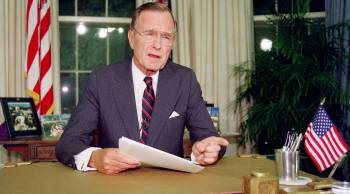Bush to avoid Chavez supporters on trip
KAI RYSSDAL: President Bush will spend most of the next week getting on and off Air Force One. He leaves tomorrow for a six day, five night stay in Latin America. Five countries in all.
But it’s the one the president’s not going to that everyone’s talking about.Venezuelan President Hugo Chavez is trying to expand his influence in the region giving away oil money. President Bush, on the other hand, won’t have it quite so easy. From the Marketplace Americas Desk at WLRN in Miami, Dan Grech reports.
DAN GRECH: President Bush’s foreign policy in Latin America can pretty much be summed up in two words: free trade.
Since he came to office, his administration signed 10 free trade deals. Meanwhile, Bush’s rival, Venezuela’s Hugo Chavez, has given out billions in cash.
SUSAN PURCELL: Latin America’s happy to take the money. Why not take the money?
Susan Purcell’s with the University of Miami. She says there’s a simple reason the U.S. doesn’t simply hand out cash like Venezuela. It tried that already.President Kennedy’s Alliance for Progress poured 22 billion bucks into the region.
PURCELL: During the days when the United States was handing out a lot of money in Latin America, everyone said, “Fine, you know, they can’t buy us. Maybe they can rent us temporarily, but they can’t buy us.” And I think Chavez will find the same thing.
Since the Cold War, the U.S. has taken a different approach. In the 90s, it formed the so-called Washington Consensus to endorse a package of tough-love free market reforms.
But most Latin Americans never felt the trickle down. The region still has the worst income inequality in the world.
Dan Griswold’s with the Cato Institute. He says free trade is still the best medicine.
DAN GRISWOLD: Look at the Latin American countries that have stuck to the reform path. Mexico and Chile, El Salvador, Peru and some other countries. They are doing better. Free trade requires some patience. It doesn’t deliver funds instantly overnight. And yet there’s a proven track record.
But delayed gratification is a harder sell than free oil.
Andres Oppenheimer
is a syndicated columnist with The Miami Herald.
ANDRES OPPENHEIMER: Free trade diplomacy doesn’t have a chance with oil diplomacy. Because oil diplomacy is cash in hand. Free trade diplomacy is a promise that if you do this, eventually you’ll be better off.
Analysts say Latin America is increasingly split in two. On one side, you have the countries that cut trade deals with the U.S., such as Mexico, Colombia and Guatemala — three stops on Bush’s trip. On the other, you have allies of Venezuela that focus on regional cooperation and lifting the poor.
Peter Hakim directs the Inter-American Dialogue
, a think tank in Washington, D.C. He says the U.S. needs to hit the social agenda harder to keep more countries from slipping to Venezuela’s side.
PETER HAKIM: The U.S.’s agenda for Latin America’s not wrong, it’s too narrow. Trade doesn’t confront the vast inequalities in the region. Those have to be addressed more directly.
Bush hopes to sway some countries still on the fence, like Brazil and Uruguay.And to do that, he’s borrowing a page from the playbook of his archrival, Fidel Castro.
On Monday, Bush offered free health care to 12 countries.
GEORGE BUSH: In June, I’m going to send one of our Navy’s medical ships, the Comfort, to the region. Altogether, the Comfort’s doctors and nurses and health care professionals expect to treat 85,000 patients and conduct up to 1,500 surgeries.
In his speech, Bush blurred the lines between his social agenda and that of his communist rivals.
BUSH: Nearly one out of four people in Latin America lives on less than $2 a day. This is a scandal, and it’s a challenge.
He even invoked Chavez hero Simon Bolivar, but in the name of another revolution:the free market revolution.
I’m Dan Grech for Marketplace.
There’s a lot happening in the world. Through it all, Marketplace is here for you.
You rely on Marketplace to break down the world’s events and tell you how it affects you in a fact-based, approachable way. We rely on your financial support to keep making that possible.
Your donation today powers the independent journalism that you rely on. For just $5/month, you can help sustain Marketplace so we can keep reporting on the things that matter to you.


















